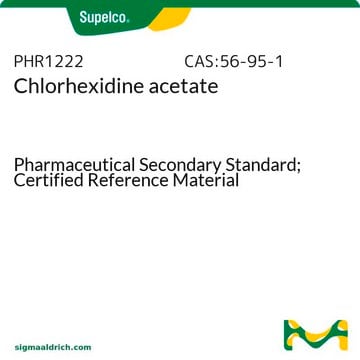PHR1421
Chlorhexidine
Pharmaceutical Secondary Standard; Certified Reference Material
Synonym(s):
Chlorhexidine, 1,1′-Hexamethylenebis[5-(4-chlorophenyl)biguanide]
About This Item
Recommended Products
grade
certified reference material
pharmaceutical secondary standard
Quality Level
Agency
traceable to Ph. Eur. C1510000
traceable to USP 1111001
API family
chlorhexidine
CofA
current certificate can be downloaded
technique(s)
HPLC: suitable
gas chromatography (GC): suitable
mp
134-136 °C (lit.)
application(s)
pharmaceutical (small molecule)
format
neat
storage temp.
2-8°C
Looking for similar products? Visit Product Comparison Guide
General description
Chlorhexidine, the most popular antiseptic of biguanides, acts as a potential antimicrobial agent against several gram-positive and a few gram-negative bacteria. It is prescribed as a medicine for the prevention and treatment of the redness, swelling, and bleeding gums associated with gingivitis in humans. It may also be used as a general-purpose disinfectant for cleansing wounds, skin, instrument, and equipment in veterinary applications. Other applications of chlorhexidine include its use as the component of shampoos, ointments, skin and wound cleansers etc.[1]
Application
Analysis Note
Other Notes
Footnote
related product
Signal Word
Danger
Hazard Statements
Precautionary Statements
Hazard Classifications
Aquatic Acute 1 - Aquatic Chronic 1 - Eye Dam. 1
Storage Class Code
11 - Combustible Solids
WGK
WGK 3
Flash Point(F)
Not applicable
Flash Point(C)
Not applicable
Choose from one of the most recent versions:
Already Own This Product?
Find documentation for the products that you have recently purchased in the Document Library.
Customers Also Viewed
Our team of scientists has experience in all areas of research including Life Science, Material Science, Chemical Synthesis, Chromatography, Analytical and many others.
Contact Technical Service









